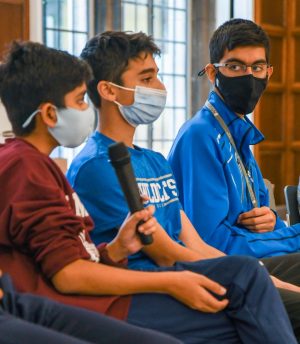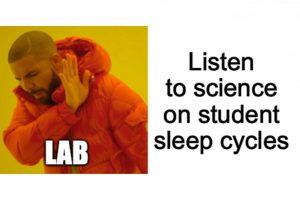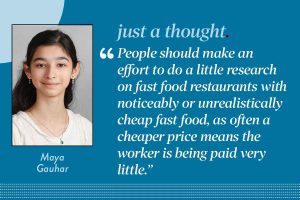Heavy workload aggravates students
November 9, 2021

With students increasingly saying they are overwhelmed from school workload, Student Council hosted a meeting Nov. 2 for students to voice their concerns and discuss organizational strategies. Students had previously shared concerns with teachers, prompting new homework policies, and some even satirized Lab’s culture through memes. Facing barriers, some have felt that proposing change has been like “talking to a wall.”
At the meeting, students shared experiences about their homework “never ending” and the difficulty balancing classes with extracurricular activities. Some said that the key has been managing their time more effectively and spreading the work over the week.
Asher Grossman, Student Council’s director of student technology services, said that in registering for accelerated and rigorous courses, he knew that homework would come at the cost of socializing and working on activities like Robotics Team.
“The extracurriculars that Lab offers, you can’t do those extracurriculars to the extent that you might want to and do the classes that you want to take,” Asher said later in an interview.
According to Brent Pennington, all-school president, Student Council members were initiating conversations with department chairs even before the meeting, attempting to address concerns about student stress. Brent said faculty pushback to reducing workload has revolved around the need to fulfill course expectations. AT, AP and accelerated classes demand greater commitment from students. Brent said teachers told him part of the Lab education is college preparation, and some teachers have mentioned to imitate the university experience students should reach out to teachers on their own.
After hearing student input at the Nov. 2 meeting, two stress-alleviating strategies emerged: implementing a “temperature check” for teachers to collect student feedback and increasing transparency about course expectations.
However, it is unclear whether another student survey will bring about change in the near future. Student Council has been working for seven years to implement a curriculum feedback system. The goal has been for students anonymously to provide input to teachers about how they feel about the quantity and quality of assignments. But after the 2020 test run, it has not gained traction due to teachers questioning its value and preferring other forms of feedback.
According to Brent, revising the Program of Studies to better articulate course expectations remains a long-term goal.
“There is no specific direct Student Council involvement,” Brent said. “It is largely Student Council members expressing concern to specific administrators and doing it in a specific and unified way so that administrators or faculty members can bring those concerns to the meetings that they’re having around the Program of Studies.”
Earlier in October, an anonymous group of students, the Secret Meme Club, felt frustrated by lack of action from the faculty and administration on students’ workload and mental health. Looking for alternative platforms to promote change, they started putting up posters of memes around the school. They consider U-High’s start time, the amount of assemblies and overall mental health of students to be the biggest issues.
“It really just feels like you’re talking to a wall,” the founder, who asked to have their name withheld, said about their time on a school committee. “We’re at those meetings where [administration is] supposed to be listening to us and taking our opinions into account. It feels like they’re just listening to parents who think they know what’s good for us, or teachers who claim to have all this experience.”
Student Council and the administration removed the memes because the club is not official, but the students in the Secret Meme Club feel that traditional methods of communicating are not effective. The club’s founder has hesitations about advocacy through those traditional methods, sharing that they felt unheard and dismissed by adults.
“The purpose is to bring up the conversation, because until there is dialogue, nothing can actually be done,” the founder said. “Then we want to also try and offer solutions, which, first of all, really shouldn’t be the students’ job to figure out. If it comes to that, we will offer solutions because that’s the only way to really move this forward.”




























































